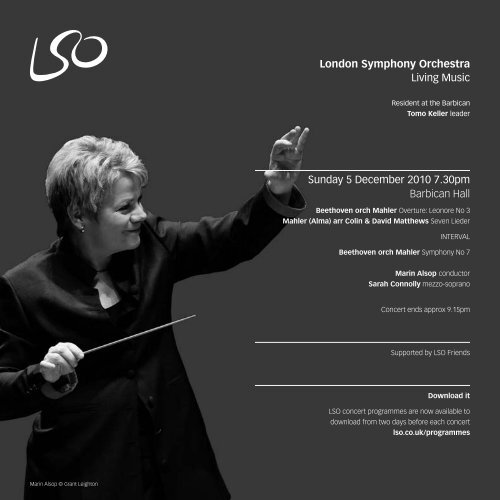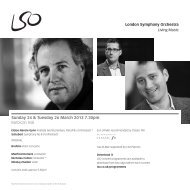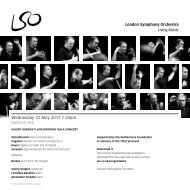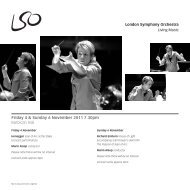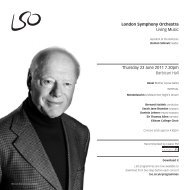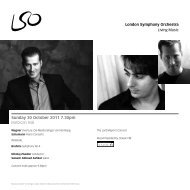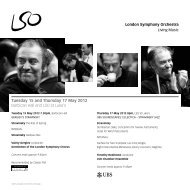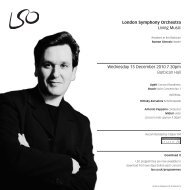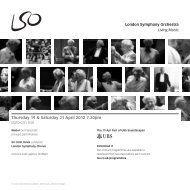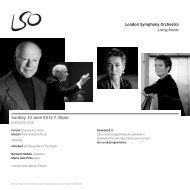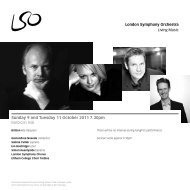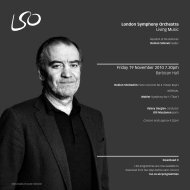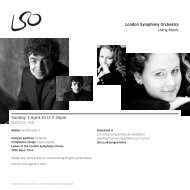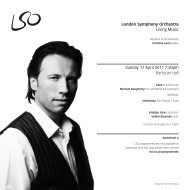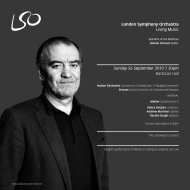Create successful ePaper yourself
Turn your PDF publications into a flip-book with our unique Google optimized e-Paper software.
<strong>Marin</strong> <strong>Alsop</strong> © Grant Leighton<br />
<strong>London</strong> <strong>Symphony</strong> <strong>Orchestra</strong><br />
Living Music<br />
Resident at the Barbican<br />
Tomo Keller leader<br />
Sunday 5 December 2010 7.30pm<br />
Barbican Hall<br />
Beethoven orch Mahler Overture: Leonore No 3<br />
Mahler (Alma) arr Colin & David Matthews Seven Lieder<br />
INTERVAL<br />
Beethoven orch Mahler <strong>Symphony</strong> No 7<br />
<strong>Marin</strong> <strong>Alsop</strong> conductor<br />
Sarah Connolly mezzo-soprano<br />
Concert ends approx 9.15pm<br />
Supported by LSO Friends<br />
Download it<br />
LSO concert programmes are now available to<br />
download from two days before each concert<br />
lso.co.uk/programmes
Welcome News<br />
Welcome to the LSO’s first concert of December where we welcome<br />
conductor <strong>Marin</strong> <strong>Alsop</strong> and mezzo-soprano Sarah Connolly.<br />
Tonight’s programme – Mahler’s orchestrations of Beethoven works,<br />
alongside songs by Mahler’s wife Alma – was conceived by <strong>Marin</strong><br />
<strong>Alsop</strong>, and is typically thought-provoking. Turn to page 10 to read her<br />
article on Mahler’s ‘retuschens’ (retouchings), which explains how, as<br />
listeners we might gain fresh insight into Beethoven’s works by seeing<br />
them through Mahler’s eyes.<br />
Sarah Connolly will be singing Alma Mahler’s Seven Lieder arranged<br />
by longstanding friends of the LSO, Colin and David Matthews.<br />
Although Alma composed many songs, her husband was unhappy<br />
with the idea of his wife working in such a way, and initially insisted<br />
that she stop. Only later did he recognise the quality of her songs and<br />
sought to have them published.<br />
Tonight’s concert is supported by LSO Friends. On behalf of everyone<br />
at the LSO, I would like to take this opportunity to thank them; their<br />
support and loyalty is invaluable. If you are interested in becoming an<br />
LSO Friend, contact Friends Co-ordinator Sophie Barnes on 020 7382<br />
2506, or visit the LSO Friends Desk on Level -1 during the interval.<br />
Kathryn McDowell<br />
LSO Managing Director<br />
Two weeks in Japan with Valery Gergiev<br />
The last two weeks have seen the <strong>Orchestra</strong> touch down in Japan,<br />
performing in Osaka, Tokyo, Omiya, Niigata and Chiba, to name but a<br />
few places. Our resident wordsmith and Principal Flute Gareth Davies<br />
has been blogging about all the goings-on; why not have a read via<br />
the address below? You can also view a great selection of tour photos<br />
on our Facebook page – check it out to see what the players have<br />
been getting up to, on and off duty (sampling local cuisine seems to<br />
be a recurring theme!)<br />
lsoontour.wordpress.com<br />
facebook.com/londonsymphonyorchestra<br />
LSO Live CDs – the perfect Christmas present<br />
If you’re stuck for gift ideas this Christmas, why not treat your nearest<br />
and dearest to the sound of the LSO in their own home? LSO Live is<br />
the best-selling orchestral own-label in the world, offering over 60 top<br />
quality CDs (including special edition box sets) from as little as £5.99.<br />
All CDs are shipped on the same or next working day, guaranteeing<br />
you much-needed wrapping time... Recent releases include Ravel’s<br />
Boléro and Rachmaninov’s <strong>Symphony</strong> No 2. For more details, to<br />
browse the complete catalogue and for special offers, visit:<br />
lso.co.uk/buyrecordings<br />
LSO Friends<br />
What does the LSO mean to you? Whatever it is, our Friends mean<br />
everything to us. They recognise our achievements and help us to<br />
go further, from full orchestral Barbican concerts to LSO Discovery<br />
groups for local residents and cross-genre groups with local teenagers,<br />
creating a truly 21st-century <strong>Orchestra</strong>. Membership starts from £50;<br />
in return, LSO Friends will receive 2011/12 priority booking as well<br />
as a regular behind-the-scenes magazine, chances to attend open<br />
rehearsals, and opportunities to meet LSO musicians at special events.<br />
lso.co.uk/lsofriends<br />
2 Welcome & News<br />
Kathryn McDowell © Camilla Panufnik
Ludwig van Beethoven (1770–1827) orch Gustav Mahler (1860–1911)<br />
Overture: Leonore No 3 (1814)<br />
Beethoven’s only opera Fidelio took ten years to reach its final state.<br />
In its first two versions, which were staged in 1805 and 1806, it was<br />
called Leonore; the overture known as Leonore No 2 was played<br />
at the 1805 production in Vienna, and an expanded and enhanced<br />
revision, Leonore No 3, in 1806 (confusingly, the overture Leonore No 1<br />
was written later, probably for a production in Prague that never took<br />
place). Beethoven was not satisfied with either of these versions and<br />
in 1814 made an extensive revision, which was performed with a new<br />
title, Fidelio, and with a new overture, which is the one played with the<br />
opera today.<br />
The second and third Leonore overtures share the same musical<br />
material and, like many operatic overtures, offer a resumé of the plot.<br />
Leonore No 3 begins in the darkness of the dungeon in which the<br />
hero Florestan has been unjustly imprisoned; the main allegro reflects<br />
his aspirations for political justice and his love for his wife, Leonore.<br />
An offstage trumpet, sounding twice, presages his release, and the<br />
overture ends in rejoicing. Beethoven, deciding that he had given too<br />
much away, first wrote Leonore No 1, which has a looser connection<br />
with the opera, and finally in Fidelio, a completely independent piece<br />
which, however, leads smoothly into the first scene.<br />
Because Leonore No 3 contains such magnificent music, some<br />
conductors, including Mahler, have played it between the two scenes<br />
of Act 2, but this reduces the effect of the final scene and is hardly<br />
ever done nowadays. Mahler also made revisions to the score of<br />
Leonore No 3, his common practice with Beethoven and with other<br />
composers he conducted, doubling the size of the woodwind from<br />
eight to sixteen to balance the strings, making many changes to the<br />
dynamics and some adjustments to the scoring.<br />
All programme notes © David Matthews<br />
David Matthews is a composer and writer. Among his many<br />
orchestral and chamber works are seven symphonies and twelve<br />
string quartets. His Seventh <strong>Symphony</strong> was premiered earlier<br />
this year by the BBC Philharmonic <strong>Orchestra</strong>. He has also written<br />
studies of Benjamin Britten and Michael Tippett, and numerous<br />
articles on contemporary music.<br />
<strong>London</strong> <strong>Symphony</strong> <strong>Orchestra</strong><br />
‘He can unleash greater musical<br />
power with an elegant flick of<br />
the baton than most conductors<br />
muster with flailing arms’ The Times<br />
Sir Colin Davis’s Beethoven in 2011<br />
13 Mar <strong>Symphony</strong> No 7 & Piano Concerto No 3<br />
20 Mar <strong>Symphony</strong> No 6 (‘Pastoral’)<br />
with Mitsuko Uchida<br />
26 May Piano Concerto No 2<br />
2 Jun Piano Concerto No 1<br />
2 & 4 Oct Piano Concerto No 3<br />
4 & 6 Dec Piano Concerto No 4<br />
11 & 13 Dec Piano Concerto No 5<br />
On Sale Now<br />
020 7638 8891<br />
lso.co.uk<br />
Programme Notes<br />
3
Alma Mahler (1879–1964) orch Colin & David Matthews<br />
Seven Lieder (1901–11)<br />
1 Die stille Stadt (The silent city)<br />
2 Laue Sommernacht (Balmy summer night)<br />
3 Licht in der Nacht (Light in the night)<br />
4 Waldseligkeit (Bliss in the woods)<br />
5 In meines Vaters Garten (In my father’s garden)<br />
6 Bei dir ist es traut (I am at ease with you)<br />
7 Erntelied (Harvest song)<br />
Sarah Connolly mezzo-soprano<br />
Alma Schindler, daughter of a notable landscape painter and brought<br />
up in a bohemian milieu, studied the piano from an early age and at<br />
14 began lessons in composition with the blind composer and organist<br />
Josef Labor. When she was 20 she met Alexander von Zemlinsky, who<br />
had taught Schoenberg and was now a successful young composer.<br />
He took her as a composition pupil, and they fell in love: the affair was<br />
about to be consummated when Alma met Gustav Mahler and was<br />
caught up in his immediate wish to make her his wife. In a notorious<br />
letter soon after they were engaged he insisted that she would have<br />
to give up any ambition of being a composer: ‘From now on, would<br />
you be able to regard my music as if it were your own? … A husband<br />
and wife who are both composers: how do you envisage that? Such<br />
a strange relationship between rivals: do you have any idea how<br />
ridiculous it would appear … if we are to be happy together, you will<br />
have to be ‘as I need you’ – not my colleague, but my wife!’<br />
Alma reluctantly complied. But in 1910, when Mahler discovered that<br />
his wife had begun an affair with the architect Walter Gropius, he was<br />
suddenly full of remorse that he had forbidden her to compose. He<br />
insisted that she revise her songs, helped her with the revisions, and<br />
had five songs published by Universal Edition, his own publisher. It<br />
was too late for Alma, who had lost the will to be a composer: in the<br />
remaining 54 years of her life she wrote only a few more songs.<br />
All of Alma Mahler’s music, in fact, consists of songs with piano:<br />
17 survive, but she implies that there were many more; it is not<br />
clear what happened to the others, though we know that some of<br />
her manuscripts were lost in the war. All her songs are settings of<br />
4 Programme Notes<br />
contemporary poets, in a turn-of-the-century style that recalls her<br />
teacher Zemlinsky; all have strong melodic lines and affecting late-<br />
Romantic harmony. They reflect the spirited, ardent young woman that<br />
we encounter in her diaries. In 1995, my brother Colin and I arranged<br />
seven of her songs for orchestra, four from the 1910 volume and<br />
three from a second volume published in 1915. Colin orchestrated the<br />
two longest songs, In meines Vaters Garten and Erntelied, and I the<br />
remaining five. We tried to find an orchestral style that we believed<br />
Alma would have used had she been able to orchestrate them herself,<br />
one quite different from her husband’s, whose music when she first<br />
heard it she thought rather old-fashioned.<br />
INTERVAL: 20 minutes<br />
Enjoyed Sarah’s singing?<br />
Book now to hear her perform in Elgar’s thrilling oratorio The Kingdom<br />
under the baton of guest conductor and Elgar champion, Sir Mark Elder.<br />
Sun 30 Jan 7.30pm<br />
Elgar The Kingdom<br />
Sir Mark Elder conductor<br />
Cheryl Barker soprano<br />
Sarah Connolly mezzo-soprano<br />
Stuart Skelton tenor<br />
Iain Paterson bass<br />
<strong>London</strong> <strong>Symphony</strong> Chorus<br />
‘I love the idea of taking<br />
[people] to places they’ve<br />
never been to before,<br />
musically’<br />
Sir Mark Elder<br />
Tickets start from just £8 – call the<br />
Box Office on 020 7638 8891<br />
or book online today at lso.co.uk
Alma Mahler<br />
Seven Lieder – Song Texts<br />
1 Die stille Stadt<br />
Liegt eine Stadt im Tale,<br />
Ein blasser Tag vergeht.<br />
Es wird nicht lange dauern mehr,<br />
Bis weder Mond noch Sterne<br />
Nur Nacht am Himmel steht.<br />
Von allen Bergen drücken<br />
Nebel auf die Stadt,<br />
Es dringt kein Dach, nicht Hof noch Haus,<br />
Kein Laut aus ihrem Rauch heraus,<br />
Kaum Türme noch und Brücken.<br />
Doch als dem Wandrer graute,<br />
Da ging ein Lichtlein auf im Grund<br />
Und durch den Rauch und Nebel<br />
Begann ein leiser Lobgesang<br />
Aus Kindermund.<br />
2 Laue Sommernacht<br />
Laue Sommernacht: am Himmel<br />
Stand kein Stern, im weiten Walde<br />
Suchten wir uns tief im Dunkel,<br />
Und wir fanden uns.<br />
Fanden uns im weiten Walde<br />
In der Nacht, der sternenlosen,<br />
Hielten staunend uns im Arme<br />
In der dunklen Nacht.<br />
War nicht unser ganzes Leben<br />
So ein Tappen, so ein Suchen?<br />
Da: In seine Finsternisse<br />
Liebe, fiel Dein Licht.<br />
3 Licht in der Nacht<br />
Ringsum dunkle Nacht, hüllt in Schwarz mich ein,<br />
zage flimmert gelb fern her ein Stern!<br />
Ist mir wie ein Trost, eine Stimme still,<br />
die dein Herz aufruft, das verzagen will.<br />
1 The silent city<br />
A town lies in the valley;<br />
A pale day fades.<br />
It will not be long<br />
Before neither moon nor stars<br />
But only night shall rule the heavens.<br />
From all the mountaintops<br />
Mists descend upon the town;<br />
No roof nor yard nor house<br />
Nor sound can pierce the smoke,<br />
Not even a tower or a bridge.<br />
But as the traveller felt fear<br />
A tiny light shone below,<br />
And through smoke and mist<br />
A soft song of praise began<br />
From the mouth of a child.<br />
2 Balmy summer night<br />
Balmy summer night, in Heaven<br />
there are no stars, in the wide forests<br />
we searched ourselves deep in darkness,<br />
And we found ourselves.<br />
Found ourselves in the wide forests<br />
in the night, saviours of the stars,<br />
Held ourselves in wonder in each other’s arms<br />
In the dark night.<br />
Was not our whole life<br />
Just a groping, just a seeking,<br />
There in its darkness<br />
Love, fell your light.<br />
3 Light in the night<br />
Dark night all around, enveloping me in black,<br />
Timidly a star flickers yellow from afar!<br />
It’s to me like a comfort, a quiet voice,<br />
Which calls on your heart that wants to give up.<br />
Song Texts<br />
5
Kleines gelbes Licht, bist mir wie der Stern<br />
überm Hause einst Jesu Christ, des Herrn<br />
und da löscht es aus. Und die Nacht wird schwer!<br />
Schlafe Herz. Schlafe Herz. Du hörst keine Stimme mehr.<br />
4 Waldseligkeit<br />
Der Wald beginnt zu rauschen,<br />
Den Bäumen naht die Nacht,<br />
Als ob sie selig lauschen,<br />
Berühren sie sich sacht.<br />
Und unter ihren Zweigen,<br />
Da bin ich ganz allein,<br />
Da bin ich ganz dein eigen :<br />
Ganz nur Dein!<br />
5 In meines Vaters Garten<br />
In meines Vaters Garten<br />
– blühe mein Herz, blüh auf –<br />
in meines Vaters Garten<br />
stand ein schattiger Apfelbaum<br />
– Süsser Traum –<br />
stand ein schattiger Apfelbaum.<br />
Drei blonde Königstöchter<br />
– blühe mein Herz, blüh auf –<br />
drei wundersame Mädchen<br />
schliefen unter dem Apfelbaum<br />
– Süsser Traum –<br />
schliefen unter dem Apfelbaum.<br />
Die allerjüngste Feine<br />
– blühe mein Herz, blüh auf –<br />
die allerjüngste Feine<br />
blinzelte und erwachte kaum<br />
– Süsser Traum –<br />
blinzelte und erwachte kaum.<br />
Die zweite fuhr sich übers Haar<br />
– blühe mein Herz, blüh auf –<br />
sah den roten Morgensaum<br />
– Süsser Traum –<br />
Sie sprach: Hört ihr die Trommel nicht<br />
6 Song Texts<br />
Little yellow light, you are like a star to me<br />
Above the house of Jesus Christ the Lord, once,<br />
And there it goes out! And the night turns heavy!<br />
Sleep, my heart! You hear no voice any more!<br />
4 Bliss in the woods<br />
The woods begin to rustle<br />
and night approaches the trees,<br />
as if it were listening happily<br />
for the right moment to caress them<br />
And under their branches<br />
I am entirely alone;<br />
I am entirely yours,<br />
entirely yours!<br />
5 In my father’s garden<br />
In my father’s garden<br />
– blossom, my heart, blossom forth! –<br />
In my father’s garden<br />
Stands a shady apple tree<br />
– Sweet dream, sweet dream! –<br />
Stands a shady apple tree.<br />
Three blonde King’s daughters<br />
– blossom, my heart, blossom forth –<br />
three beautiful maidens<br />
slept under the apple tree…<br />
– Sweet dream, sweet dream! –<br />
Slept under the apple tree.<br />
The youngest of the three<br />
– blossom, my heart, blossom forth! –<br />
the youngest of the three<br />
blinked and hardly woke.<br />
– Sweet dream, sweet dream! –<br />
Blinked and hardly woke.<br />
The second cleared her hair from her eyes<br />
– blossom, my heart, blossom forth! –<br />
and saw the red morning’s hem<br />
– Sweet dream, sweet dream! –<br />
She spoke: ‘did you not hear the drum?’
– blühe mein Herz, blüh auf –<br />
Süsser Traum<br />
hell durch den dämmernden Raum?<br />
Mein Liebster zieht zum Kampf hinaus<br />
– blühe mein Herz, blüh auf –<br />
mein Liebster zieht zum Kampf hinaus,<br />
küsst mir als Sieger des Kleides Saum<br />
– Süsser Traum –<br />
küsst mir als Sieger des Kleides Saum!<br />
Die dritte sprach und sprach so leis<br />
– blühe mein Herz, blüh auf –<br />
die dritte sprach und sprach so leis:<br />
Ich küsse dem Liebsten des Kleides Saum<br />
– Süsser Traum –<br />
ich küsse dem Liebsten des Kleides Saum.<br />
In meines Vaters Garten<br />
– blühe mein Herz, blüh auf –<br />
in meines Vaters Garten<br />
steht ein sonniger Apfelbaum<br />
– Süsser Traum –<br />
steht ein sonniger Apfelbaum!<br />
6 Bei dir ist es traut<br />
Bei dir ist es traut,<br />
zage Uhren schlagen wie aus alten Tagen,<br />
komm mir ein Liebes sagen,<br />
aber nur nicht laut!<br />
Ein Tor geht irgendwo<br />
draußen im Blütentreiben,<br />
der Abend horcht an den Scheiben,<br />
laß uns leise bleiben,<br />
keiner weiß uns so!<br />
– blossom, my heart, blossom forth! –<br />
Sweet dream, sweet dream<br />
clearly through the twilight air!<br />
My beloved joins in the strife<br />
– blossom, my heart, blossom forth –<br />
My beloved joins in the strife out there,<br />
‘Kiss for me as victor his garment’s hem.’<br />
– Sweet dream, sweet dream. –<br />
‘Kiss for me as victor his garment’s hem.’<br />
The third spoke and spoke so soft,<br />
– blossom, my heart, blossom forth! –<br />
The third spoke and spoke so soft:<br />
‘I kiss the beloved’s garment’s hem.’<br />
– Sweet dream, sweet dream! –<br />
‘I kiss the beloved’s garment’s hem.’<br />
In my father’s garden<br />
– blossom, my heart, blossom forth! –<br />
In my father’s garden<br />
stands a sunny apple tree<br />
– Sweet dream, sweet dream! –<br />
Stands a sunny apple tree.<br />
6 I am at ease with you<br />
I am at ease with you,<br />
faint clocks strike as from olden days,<br />
Come, tell your love to me,<br />
But not too loud!<br />
Somewhere a gate moves<br />
Outside in the drifting blossoms,<br />
Evening listens in at the window panes,<br />
Let us stay quiet,<br />
So no one knows of us!<br />
Song Texts<br />
7
8<br />
7 Erntelied<br />
Der ganze Himmel glüht<br />
In hellen Morgenrosen;<br />
Mit einem letzten, losen Traum noch im Gemüt,<br />
Trinken meine Augen diesen Schein.<br />
Wach und wacher, wie Genesungswein,<br />
Und nun kommt von jenen Rosenhügeln<br />
Glanz des Tags und Wehn von seinen Flügeln,<br />
Kommt er selbst. Und alter Liebe voll,<br />
Daß ich ganz an ihm genesen soll,<br />
Gram der Nacht und was sich sacht verlor,<br />
Ruft er mich an seine Brust empor.<br />
Und die Wälder und die Felder klingen,<br />
Und die Gärten heben an zu singen.<br />
Fern und dumpf rauscht das erwachte Meer.<br />
Segel seh’ ich in die Sonnenweiten,<br />
Weiße Segel, frischen Windes, gleiten,<br />
Stille, goldne Wolken obenher.<br />
Und im Blauen, sind es Wanderflüge?<br />
Schweig o Seele! Hast du kein Genüge?<br />
Sieh, ein Königreich hat dir der Tag verliehn.<br />
Auf! und preise ihn!<br />
Song Texts<br />
7 Harvest song<br />
The whole sky glows<br />
In bright morning roses;<br />
With one last loose dream still in my soul<br />
My eyes drink in this light,<br />
More and more awake, like the wine of health.<br />
And now comes the glow of the day<br />
From that hill of roses, and the stir of its wings,<br />
Comes day itself, and filled with old love,<br />
That through it I shall overcome<br />
Grief of night and what else got lost,<br />
Day calls me up to its bosom!<br />
And as the woods and the fields ring<br />
And the gardens begin to sing.<br />
Far and dull the sea roars, awoken.<br />
I see sails gliding into the sunny distance,<br />
White sails of the fresh wind,<br />
Quiet, golden clouds aloft, clouds above<br />
And in the blueness are these migrant birds?<br />
Be quiet, o soul, are you not satiated?<br />
Look, a kingdom the day granted you.<br />
Go! Let your deeds praise it!
Ludwig van Beethoven (1770–1827) orch Gustav Mahler (1860–1911)<br />
<strong>Symphony</strong> No 7 (1811–1812)<br />
1 Poco sostenuto – Vivace<br />
2 Allegretto<br />
3 Presto – Assai meno presto (trio)<br />
4 Allegro con brio<br />
The Seventh <strong>Symphony</strong> was composed in 1811–12, towards the<br />
end of an extraordinarily creative period for Beethoven. It was<br />
immediately followed by the Eighth, but then there were several<br />
lean years before the culminating works of his last period. The<br />
Seventh was premiered, with Beethoven conducting, at a concert<br />
in December 1813 which also included the first performance<br />
of Wellington’s Victory, the so-called ‘Battle <strong>Symphony</strong>’, hugely<br />
acclaimed at the time but now forgotten.<br />
Wagner famously called Beethoven’s Seventh <strong>Symphony</strong> ‘the<br />
apotheosis of the dance’ (and apparently once substantiated his<br />
remark by dancing to the <strong>Symphony</strong> to Liszt’s piano accompaniment).<br />
The other often quoted saying about the Seventh, attributed to<br />
Weber by Beethoven’s biographer Anton Schindler, that Beethoven<br />
was now ‘quite ripe for the madhouse’, may be spurious, though it<br />
probably represented Weber’s views. In any case, the impression<br />
given by these two remarks of an early 19th-century Rite of Spring<br />
is not entirely misleading. It could be claimed that Beethoven and<br />
Stravinsky are the two composers whose music most powerfully<br />
expresses the sensation of physical energy. In each of the four<br />
movements of the Seventh <strong>Symphony</strong>, Beethoven seizes on a small<br />
rhythmic phrase and repeats it over and over again: this sounds<br />
rather like minimalism, but minimalist energy is always static –<br />
running on the spot; whereas Beethoven’s harmony constantly<br />
changes and the music is always moving forward: it is dynamic<br />
in the fullest sense.<br />
With this emphasis on constant dynamism, there is no real slow<br />
movement, though the first movement begins with the largest<br />
and most impressive of all Beethoven’s slow introductions, with a<br />
wonderfully prolonged transition to the Vivace. A slow movement<br />
would normally be in a different key from the first, but the Seventh’s<br />
Allegretto continues in A – minor in place of major – and is a kind<br />
of stately dance, very serious, but instantly popular with audiences<br />
(at the premiere it was even encored). The change of key comes<br />
with the scherzo, which is in F and light-footed, in contrast to the<br />
resplendently sonorous trio in D, which comes twice. In the finale<br />
the energy reaches new Dionysian heights.<br />
Mahler made extensive retouchings to the score of the Seventh,<br />
as he did with other Beethoven symphonies he conducted. He<br />
told his friend and biographer Natalie Bauer-Lechner: ‘Beethoven’s<br />
symphonies present a problem that is simply insoluble for the<br />
ordinary conductor … Unquestionably, they need re-interpretation<br />
and re-working. The very constitution and size of the orchestra<br />
necessitates it: in Beethoven’s time, the whole orchestra was not as<br />
large as the string section alone today. If, consequently, the other<br />
instruments are not brought into a balanced relationship with the<br />
strings, the effect is bound to be wrong’. His many changes are<br />
mostly concerned with dynamics: some pages contain more than<br />
50 modifications (Mahler is very fond of ppp and occasionally even<br />
pppp); but he also rewrites instrumental parts, especially the horns<br />
and trumpets, and at one point in the scherzo removes nine bars<br />
of woodwind and horns altogether. He also doubles the woodwind<br />
and horns, and has the timpani retune in several places in the finale<br />
(something Beethoven never did within a movement).<br />
Mahler did not know that, at the premiere of the Seventh, Beethoven<br />
had a string section more or less the same size as his own in Vienna,<br />
and probably also a doubled wind section. Some contemporary<br />
critics censured Mahler for changing Beethoven’s scores (though he<br />
was by no means the only conductor of his generation to make such<br />
revisions), but it seems that he was ‘authentic’ before his time. And<br />
Mahler had an understanding of orchestration second to none, so<br />
that anything that he did is at least interesting and at best, revelatory.<br />
Programme Notes<br />
9
10<br />
Where does creation end?<br />
<strong>Marin</strong> <strong>Alsop</strong> discusses<br />
Gustav Mahler’s desire<br />
to make his mark on his<br />
idol’s work<br />
Improving upon creation is a complicated business. So it goes with<br />
the question of Mahler’s retuschens (retouchings) of Beethoven’s<br />
symphonies. For all of us, the Beethoven symphonies are a<br />
breakthrough moment, an arrival point in the history of Western<br />
civilization; serving as both fundamental building blocks as well as<br />
a measuring stick for all that came before and all that would follow.<br />
They embody the essence of the human spirit conveyed through<br />
the abstract beauty of our shared universal language, musical<br />
poetry and sung architecture. The thought of ‘bettering’ these<br />
symphonies is part sacrilege, part egomaniacal suicide, at best.<br />
But that is exactly what Gustav Mahler felt compelled to do.<br />
By the turn of the twentieth century, the Beethoven symphonies had<br />
risen to archetypal stature. It is a testament to Mahler’s unwavering<br />
musical opinion and single minded determination that he could not<br />
resist the compulsion to tweak Beethoven’s work and to adapt it to, in<br />
his opinion, better suit the contemporary orchestra, concert halls and<br />
listening public. Mahler felt Beethoven’s hand on his shoulder and was<br />
convinced that Beethoven would have not only approved of his edits,<br />
but most likely would have made them himself had he experienced<br />
the new developments in performance techniques.<br />
Article<br />
Spending time with Mahler’s ‘retuschens’, a term never actually<br />
used by Mahler, has been a revelation for me, albeit an unexpected<br />
one. For the ‘recreators’, such as myself, interpreting the Beethoven<br />
symphonies is a daunting prospect in itself. Interpreting Beethoven’s<br />
works through the lens of yet another highly opinionated, strong<br />
willed artist adds a whole new dimension to the challenge. Seeing<br />
where Mahler reinforces the instrumentation, graduates, shades and<br />
tiers the dynamics, and discovering his approach to taking liberties<br />
with the tempi, all give me enormous insight into Mahler’s personal<br />
view of Beethoven’s works. My goal, as recreator, is to gather as<br />
many clues as possible in my quest to unearth the compelling story<br />
behind the piece. I search for that magic key that unlocks the door<br />
to the creator’s psyche, giving me insight into his motivation for<br />
that particular creation. Working on Mahler’s retouchings had me<br />
constantly questioning whose story I was uncovering: Beethoven’s,<br />
or Mahler’s version of Beethoven’s story? Does it matter?<br />
Growing up as an artist under the wing of Leonard Bernstein,<br />
it matters hugely. Black notes on the white page without humanity<br />
are empty, like words without inflection or point of view. Just as I<br />
was always moved by Bernstein’s unwavering sense of righteousness,<br />
<strong>Marin</strong> <strong>Alsop</strong> © Grant Leighton
I was deeply impressed by Mahler’s sheer nerve. He would have<br />
known that every member of the Vienna Philharmonic felt a proprietary<br />
ownership of Beethoven’s music; it would not be a stretch to say that<br />
the Beethoven symphonies were already classical music’s biblical books.<br />
Mahler also revered Beethoven, but Mahler was the consummate<br />
creator and recreator, a conductor who transformed symphonic<br />
and operatic performance, setting the bar for artistic excellence<br />
miles above where it been before. His personal experience with the<br />
20th-century orchestra sent him down a messianic path to improve<br />
upon Beethoven’s work. But where then does Beethoven end and<br />
Mahler begin? Where does one draw the line and say ‘this is too much’?<br />
It is not unusual for musicians to comment<br />
that Beethoven, because of his deafness,<br />
may have been imagining something that was<br />
beyond the grasp of conventional instruments.<br />
In light of the extensive period of instrument revolution, the question<br />
of authenticity versus personal interpretation is a vivid and real<br />
one that we recreators constantly grapple with. Mahler’s edits<br />
give that question new weight and daunting significance. Though<br />
many musicians, critics and orchestra patrons were sceptical and<br />
sometimes even hostile towards Mahler’s ‘redaktions’ (editings), as<br />
he preferred to call them, his intention was to convey the spirit of<br />
the work, albeit at the expense of being sometimes faithless to the<br />
composer’s indicated orchestrations or dynamic indications. One<br />
would think this could be the result of a very arrogant conductor, yet<br />
we know from reminisces of his contemporaries that Mahler was<br />
humble to the art. Pianist, conductor and composer Ossip Gabrilovitch<br />
wrote, ‘No man ever had a more loving or truly sympathetic heart<br />
than Mahler, but with those who placed their art beneath their ego,<br />
he had not patience’. And just as Mahler was known to revise his own<br />
works, these editings of other composer’s works were constantly<br />
revised according to a variety of circumstances; hall acoustics and the<br />
particular abilities of the orchestra he was conducting were factors he<br />
considered when making adjustments.<br />
It is not unusual for musicians to comment that Beethoven, because<br />
of his deafness, may have been imagining something that was beyond<br />
the grasp of conventional instruments, or perhaps in an aural sense<br />
had one foot in this world and the other in the next. Mahler’s editing<br />
was intended to help Beethoven realise his soundworld had he had<br />
the resources of the modern orchestra: to Mahler, his editings were<br />
born out of respect to the Master.<br />
The extent of Mahler’s edits vary greatly, depending on the piece.<br />
With Beethoven’s Leonore Overture No 3, an overture Mahler<br />
performed frequently in concert and also incorporated between<br />
scenes of the last act of Fidelio, there is a minimum of alteration;<br />
Mahler actually capitalised on an orchestration technique that<br />
Beethoven himself already used in the overture – the thinning out<br />
of players to aid balance or enhance clarity. Beethoven applies this<br />
technique in the final section of the overture that begins with a flurry<br />
of scale passages in the first violins. Beethoven instructs that two or<br />
three violins begin the passage, then as the passage advances, more<br />
players are added. Mahler uses this same device at the beginning of<br />
the Allegro that follows the introduction of the overture.<br />
And though it is not a matter of editing, Mahler had definite ideas<br />
about how particular passages were to be played. As related by<br />
Mahler’s Leader of the New York Philharmonic, Mahler wanted the<br />
trumpet calls to be played non espressivo, because as Mahler stated,<br />
‘In the barracks one makes no nuances’.<br />
In Beethoven’s Seventh <strong>Symphony</strong>, Mahler’s alterations and edits are<br />
far more extensive, including repeatedly thinning out the scoring for<br />
clarity, and doubling certain passages for better projection. The main<br />
thing Mahler wanted to convey was what he felt was the intention<br />
of the symphony – that the audience leaves the hall with a feeling of<br />
Dionysian intoxication.<br />
If we can agree that Mahler’s primary goal was to emphasise and<br />
reinforce Beethoven’s intentions, I think we can experience new<br />
insight into Beethoven through Mahler’s eyes.<br />
© <strong>Marin</strong> <strong>Alsop</strong><br />
Article<br />
11
<strong>Marin</strong> <strong>Alsop</strong><br />
Conductor<br />
‘Under the careful baton of<br />
<strong>Marin</strong> <strong>Alsop</strong>, the feel-good factor<br />
was stratospheric.’<br />
The Guardian, Jul 10<br />
<strong>Marin</strong> <strong>Alsop</strong> is recognised across the world<br />
for her innovative approach to programming,<br />
her deep commitment to education and to<br />
the development of audiences of all ages.<br />
Her conducting career was launched in<br />
1989, when she was a prizewinner at the<br />
Leopold Stokowski International Conducting<br />
Competition in New York; in the same year<br />
she was the first woman to be awarded the<br />
Koussevitzky Conducting Prize from the<br />
Tanglewood Music Cente, where she was a<br />
pupil of Leonard Bernstein, among others.<br />
<strong>Marin</strong> <strong>Alsop</strong>’s success as Music Director<br />
of the Baltimore <strong>Symphony</strong> <strong>Orchestra</strong> was<br />
recognised in 2009, when her tenure was<br />
extended to 2015. She retains strong links<br />
with all of her previous orchestras – the<br />
Bournemouth <strong>Symphony</strong> <strong>Orchestra</strong>, where<br />
she was Principal Conductor from 2002 to<br />
2008 and now holds the post of Conductor<br />
Emeritus, and the Colorado <strong>Symphony</strong><br />
<strong>Orchestra</strong>, where she was Music Director<br />
from 1993 to 2005 and is now Music Director<br />
Laureate. Since 1992, <strong>Marin</strong> <strong>Alsop</strong> has been<br />
Music Director of California’s Cabrillo Festival<br />
of Contemporary Music, where she has built<br />
a devoted audience for new music.<br />
<strong>Marin</strong> <strong>Alsop</strong> is a regular guest conductor<br />
with the New York Philharmonic, Philadelphia<br />
<strong>Orchestra</strong> and Los Angeles Philharmonic, the<br />
Royal Concertgebouw <strong>Orchestra</strong>, Tonhalle<br />
Zürich, Orchestre de Paris, Bavarian Radio<br />
<strong>Symphony</strong> and La Scala Milan. She has a<br />
close relationship with both the <strong>London</strong><br />
<strong>Symphony</strong> and the <strong>London</strong> Philharmonic<br />
and appears with them regularly. She also<br />
returns frequently to orchestras such as the<br />
Netherlands Radio Philharmonic, Frankfurt<br />
RSO, Royal Stockholm Philharmonic, Danish<br />
Radio <strong>Symphony</strong>, Oslo Philharmonic and<br />
the Czech Philharmonic. She collaborates<br />
closely with the Southbank Centre, and<br />
in the 2009/10 season was appointed<br />
Artistic Director of the year-long Bernstein<br />
Project which culminated in a large-scale<br />
performance of his Mass.<br />
Since taking up her position in Baltimore<br />
in September 2007, <strong>Marin</strong> <strong>Alsop</strong> has<br />
spearheaded educational initiatives which<br />
reach more than 60,000 school and preschool<br />
students. In 2008, she launched<br />
OrchKids, an after-school programme<br />
designed to provide music education,<br />
instruments and mentorship to the city’s<br />
neediest young people. Another of her major<br />
initiatives as Music Director in Baltimore is<br />
the BSO Academy, a community venture that<br />
<strong>Marin</strong> <strong>Alsop</strong> first led in June 2010, whereby<br />
local non-professional musicians work<br />
in depth over the period of a week with<br />
members of the Baltimore <strong>Symphony</strong>.<br />
<strong>Marin</strong> <strong>Alsop</strong>’s extensive discography, which<br />
already includes a notable set of Brahms<br />
symphonies with the <strong>London</strong> Philharmonic<br />
<strong>Orchestra</strong>, is further distinguished by a new<br />
Dvorák series, which has been praised in<br />
Gramophone magazine (Editor’s Choice,<br />
December 2010), International Record Review<br />
and Neue Musik-Zeitung. For her recent<br />
recordings of John Adams’s Nixon in China<br />
and Leonard Bernstein’s Mass, The Financial<br />
Times gave Nixon in China five stars, calling<br />
it an ‘incandescent performance’, whilst<br />
Gramophone chose the Mass as Editor’s<br />
Choice in its 2010 Awards.<br />
In 2008 <strong>Marin</strong> <strong>Alsop</strong> became a Fellow of the<br />
American Academy of Arts & Sciences, and<br />
in the following year was chosen as Musical<br />
America’s Conductor of the Year 2009. She is<br />
the recipient of numerous awards in the US<br />
and Europe, including a European Women of<br />
Achievement Award for 2007, and is the only<br />
conductor to receive a MacArthur Fellowship.<br />
12 The Artists<br />
<strong>Marin</strong> <strong>Alsop</strong> © Grant Leighton
Sarah Connolly<br />
Mezzo-soprano<br />
‘All her customary musicality was<br />
radiantly in evidence: she is an<br />
artist incapable of singing a<br />
broken or ugly phrase, and her<br />
ornamentation was exquisite.<br />
She looked wonderful, too.’<br />
The Telegraph, Jun 10<br />
Born in County Durham, mezzo-soprano<br />
Sarah Connolly studied piano and singing at<br />
the Royal College of Music, of which she is<br />
now a Fellow. She was made CBE in the 2010<br />
New Year’s Honours List.<br />
In opera, recent appearances include<br />
Purcell’s Dido and Aeneas at the Royal Opera<br />
House, Covent Garden; at La Scala, Milan and<br />
at La Monnaie, Brussels; Komponist (Ariadne<br />
auf Naxos) and Annio (La clemenza di Tito) at<br />
the Metropolitan Opera, New York; the title<br />
role in Giulio Cesare and Brangäne (Tristan<br />
und Isolde) at the Glyndebourne Festival;<br />
Gluck’s Orfeo and the title role in The Rape<br />
of Lucretia at the Bayerische Staatsoper,<br />
Sarah Connolly © Gautier Deblonde<br />
Munich; Sesto (Giulio Cesare) at the Paris<br />
Opera and Nerone (L’Incoronazione di<br />
Poppea) at the Gran Teatro del Liceu<br />
in Barcelona, and at the Maggio Musicale<br />
in Florence.<br />
She has also sung the title role in Maria<br />
Stuarda and Romeo (I Capuleti e i Montecchi)<br />
for Opera North; Komponist for the<br />
Welsh National Opera and Octavian (Der<br />
Rosenkavalier) for Scottish Opera. A favourite<br />
at English National Opera, her roles there<br />
have included Octavian; Handel’s Agrippina,<br />
Xerxes, Ariodante and Ruggiero (Alcina);<br />
the title role in The Rape of Lucretia; Ottavia<br />
(L’incoronazione di Poppea); Dido (Dido and<br />
Aeneas/The Trojans); Romeo, Susie (The<br />
Silver Tassie) and Sesto (La clemenza di<br />
Tito) – for which she was nominated for an<br />
Olivier Award for Outstanding Achievement<br />
in Opera.<br />
She has appeared in recital in <strong>London</strong><br />
and New York and her many concert<br />
engagements include appearances at<br />
the Aldeburgh, Edinburgh, Salzburg and<br />
Tanglewood Festivals and at the BBC Proms<br />
where, in 2009, she was a memorable<br />
guest soloist at The Last Night. Other recent<br />
engagements have included The Dream<br />
of Gerontius with the Boston <strong>Symphony</strong><br />
<strong>Orchestra</strong> and Sir Colin Davis; Das Lied von<br />
der Erde with the Royal Concertgebouw<br />
<strong>Orchestra</strong> and Daniel Harding; Des Knaben<br />
Wunderhorn with L’Orchestre des Champs-<br />
Elysées and Phillippe Herreweghe; Tristan<br />
und Isolde with the <strong>Orchestra</strong> of the Age of<br />
Enlightenment and Sir Simon Rattle; La mort<br />
de Cléopâtre with the Hallé and Sir Mark<br />
Elder and Mahler’s Kindertotenlieder with<br />
the LPO and Vladimir Jurowski.<br />
Committed to promoting new music, her<br />
world premiere performances include Mark-<br />
Anthony Turnage’s Twice through the heart<br />
with the Schoenberg Ensemble conducted<br />
by Oliver Knussen; Jonathan Harvey’s Songs<br />
of Li Po at the Aldeburgh Festival and, most<br />
recently, Sir John Tavener’s Tribute to Cavafy<br />
at <strong>Symphony</strong> Hall, Birmingham.<br />
A prolific recording artist, her many discs<br />
include Purcell’s Dido and Aeneas with the<br />
<strong>Orchestra</strong> of the Age of Enlightenment,<br />
Elgar’s Sea Pictures with the Bournemouth<br />
<strong>Symphony</strong> <strong>Orchestra</strong> (nominated for a<br />
Grammy Award) and Mozart’s Mass in<br />
C Minor and Haydn’s Scena di Bernice with<br />
the Gabrieli Consort and Paul McCreesh. Her<br />
recording of Handel arias with The Sixteen<br />
and Harry Christophers was described as ‘the<br />
definition of captivating’ and two recital discs<br />
The Exquisite Hour and Songs of Love and<br />
Loss have both won universal critical acclaim.<br />
Future engagements include Sesto at the<br />
Festival d’Aix-en-Provence; Clairon (Capriccio)<br />
at the Metropolitan Opera, New York and<br />
returns to the Paris Opera, Gran Teatro del<br />
Liceu in Barcelona, Glyndebourne Festival,<br />
English National Opera, and to the Royal Opera<br />
House, Covent Garden.<br />
Sarah Connolly studies with Gerald Martin<br />
Moore.<br />
The Artists<br />
13
On stage<br />
First Violins<br />
Tomo Keller Leader<br />
Lennox Mackenzie<br />
Nicholas Wright<br />
Nigel Broadbent<br />
Laurent Quenelle<br />
Harriet Rayfield<br />
Colin Renwick<br />
Ian Rhodes<br />
Sylvain Vasseur<br />
Rhys Watkins<br />
Gabrielle Painter<br />
David Worswick<br />
Violaine Delmas<br />
Eleanor Fagg<br />
Helen Paterson<br />
Alina Petrenko<br />
Second Violins<br />
Evgeny Grach<br />
Thomas Norris<br />
Sarah Quinn<br />
David Ballesteros<br />
Richard Blayden<br />
Belinda McFarlane<br />
Iwona Muszynska<br />
Philip Nolte<br />
Paul Robson<br />
Louise Shackelton<br />
Dunja Lavrova<br />
Oriana Kriszten<br />
Samantha Wickramasinghe<br />
Victoria Hands<br />
14 The <strong>Orchestra</strong><br />
Violas<br />
Edward Vanderspar<br />
Malcolm Johnston<br />
Regina Beukes<br />
Richard Holttum<br />
Robert Turner<br />
Jonathan Welch<br />
Arnaud Ghillebaert<br />
Nancy Johnson<br />
Fiona Opie<br />
Caroline O’Neill<br />
Elizabeth Butler<br />
Philip Hall<br />
Cellos<br />
Timothy Hugh<br />
Alastair Blayden<br />
Jennifer Brown<br />
Noel Bradshaw<br />
Daniel Gardner<br />
Keith Glossop<br />
Hilary Jones<br />
Minat Lyons<br />
Judith Herbert<br />
Susan Dorey<br />
Double Basses<br />
Rinat Ibragimov<br />
Colin Paris<br />
Patrick Laurence<br />
Matthew Gibson<br />
Thomas Goodman<br />
Jani Pensola<br />
Benjamin Griffiths<br />
Simo Vaisanen<br />
Flutes<br />
Adam Walker<br />
Siobhan Grealy<br />
Eilidh Gillespie<br />
Piccolo<br />
Sharon Williams<br />
Oboes<br />
Jerome Guichard<br />
John Lawley<br />
Nicola Holland<br />
Cor Anglais<br />
Christine Pendrill<br />
Clarinets<br />
Andrew Marriner<br />
Chi-Yu Mo<br />
Lorenzo Iosco<br />
James Burke<br />
Bassoons<br />
Bernardo Verde<br />
Dominic Morgan<br />
Christopher Gunia<br />
Susan Frankel<br />
Horns<br />
David Pyatt<br />
Angela Barnes<br />
Jonathan Lipton<br />
Jeffrey Bryant<br />
Trumpets<br />
Roderick Franks<br />
Gerald Ruddock<br />
Offstage Trumpet<br />
Nigel Gomm<br />
Trombones<br />
Dudley Bright<br />
James Maynard<br />
Bass Trombone<br />
Paul Milner<br />
Timpani<br />
Antoine Bedewi<br />
Percussion<br />
Neil Percy<br />
Harp<br />
Karen Vaughan<br />
LSO String<br />
Experience Scheme<br />
Established in 1992, the<br />
LSO String Experience<br />
Scheme enables young string<br />
players at the start of their<br />
professional careers to gain<br />
work experience by playing in<br />
rehearsals and concerts with<br />
the LSO. The scheme auditions<br />
students from the <strong>London</strong><br />
music conservatoires, and 20<br />
students per year are selected<br />
to participate. The musicians<br />
are treated as professional<br />
’extra’ players (additional to<br />
LSO members) and receive<br />
fees for their work in line with<br />
LSO section players. Students<br />
of wind, brass or percussion<br />
instruments who are in their<br />
final year or on a postgraduate<br />
course at one of the <strong>London</strong><br />
conservatoires can also<br />
benefit from training with LSO<br />
musicians in a similar scheme.<br />
Mark Lee (first violin), Ilona<br />
Bondar (viola) and Yuki Ito<br />
(cello) took part in rehearsals<br />
for tonight’s concert as part<br />
of the LSO String Experience<br />
Scheme. Mark Lee also performs<br />
on stage this evening.<br />
The LSO String Experience<br />
Scheme is generously<br />
supported by the Musicians<br />
Benevolent Fund and Charles<br />
and Pascale Clark.<br />
List correct at time of<br />
going to press<br />
See page xv for <strong>London</strong><br />
<strong>Symphony</strong> <strong>Orchestra</strong> members<br />
Editor Edward Appleyard<br />
edward.appleyard@lso.co.uk<br />
Print<br />
Cantate 020 7622 3401<br />
Advertising<br />
Cabbell Ltd 020 8971 8450
What does the<br />
LSO mean to you?<br />
Whatever it is,<br />
our Friends mean<br />
everything to us…<br />
Support the <strong>Orchestra</strong>.<br />
Become an LSO Friend.<br />
The LSO’s mission ‘To make the finest music available<br />
to the greatest number of people’ is at the core<br />
of everything we do. LSO Friends play a vital role<br />
in making this possible, by providing philanthropic<br />
support for the <strong>Orchestra</strong>’s concert season and a<br />
wide variety of LSO Discovery projects.<br />
Joining is easy and takes just a few minutes<br />
online, on the phone, or in person. LSO Friends<br />
Membership ranges from £50 to £500+. In return<br />
you will receive priority booking, advance season<br />
information, regular updates, the chance to attend<br />
open rehearsals, and the opportunity to meet the<br />
musicians at concerts and special events.<br />
Join online at lso.co.uk/lsofriends<br />
Call us on 020 7382 2506 or visit Intermezzo,<br />
the meeting place for Friends on Level -1,<br />
before each Barbican concert and during<br />
the interval.<br />
…Join us!<br />
lso.co.uk/lsofriends<br />
Gordan Nikolitch and Nikolaj Znaider © Kevin Leighton
Inbox<br />
Your thoughts and comments about recent performances<br />
My friends and I have seen<br />
Tim Garland many times and<br />
in many different line-ups but<br />
last Wednesday’s concert<br />
[at LSO St Luke’s] was really<br />
special. The addition of the<br />
extra musicians to the Storms<br />
Nocturnes Trio made for a<br />
great overall sound and the<br />
spin-off duos and trios added<br />
a wonderful variety to the<br />
proceedings. [Pianist] Geoffrey<br />
Keezer said on the night that<br />
LSO St Luke’s is a great venue<br />
and I must agree – it’s our<br />
favourite music venue in<br />
<strong>London</strong> ... giving a more intimate<br />
atmosphere than the large<br />
concert halls. More please!<br />
17 Nov 10, LSO St Luke’s<br />
Tim Garland & Neil Percy /<br />
UBS Eclectica: Momentum 2010<br />
16 Inbox<br />
‘Wonderful variety’<br />
Roger Phillips<br />
‘Transporting’<br />
David<br />
For me the Shchedrin concerto<br />
was largely undistinguished –<br />
a collective of small inauspicious<br />
riffs, an underwhelming<br />
orchestration, and a duration<br />
double its content merited ...<br />
the Mahler by comparison<br />
was an exhilarating triumph,<br />
sensationally played, visceral<br />
and moving, the LSO tender and<br />
violent, loving and scabrous by<br />
turns. The audience whooped<br />
their appreciation – and so did I.<br />
A wonderful triumphant<br />
transporting performance –<br />
bravo!<br />
19 Nov 10, Valery Gergiev & Olli<br />
Mustonen / Rodion Shchedrin &<br />
Mahler<br />
‘Remarkable’<br />
Robin Self<br />
The performance of the Elgar<br />
was sublime and in my living<br />
memory only Menuhin has<br />
played this concerto better than<br />
Znaider. I heard Yehudi on several<br />
occasions in the 1960s and<br />
1970s with various conductors<br />
including Boult and in my<br />
opinion, of living conductors, only<br />
Sir Colin [Davis] is his equal.<br />
This was, in fact, more Sir Colin’s<br />
performance than Znaider’s;<br />
the sounds that he produced<br />
from your orchestra (as he did<br />
in the recent recording) were<br />
remarkable. If I hear a greater<br />
performance in the future, I shall<br />
consider myself truly blessed.<br />
Please thank all your musicians,<br />
and especially Sir Colin, for a very<br />
memorable evening.<br />
10 Nov 10, Sir Colin Davis &<br />
Nikolaj Znaider / Elgar &<br />
Mendelssohn<br />
Want to share your views?<br />
Email us at comment@lso.co.uk<br />
Let us know what you think.<br />
We’d love to hear more from you<br />
on all aspects of the LSO’s work.<br />
Please note that the LSO may edit your<br />
comments and not all emails will be published.<br />
From Facebook and Twitter...<br />
Last Saturday I had the unbelievable<br />
luck listening to the LSO at the<br />
Luxemburgish Philharmony.<br />
It was an experience that I will never<br />
forget in my life. I wish I could listen<br />
to you every day (not just on CD).<br />
You guys made my life richer that<br />
day. I THANK YOU SO MUCH.<br />
Thomas [13 Nov 10, on tour]<br />
I was in the concert in Paris. That<br />
was completely amazing. I have<br />
never seen a relation between a<br />
soloist as strong as I saw it yesterday<br />
during the Brahms. Thank you at the<br />
LSO for this concert!<br />
Lionel Speciale [14 Nov 10, on tour]<br />
@AliceSaraOtt Fantastic performance<br />
with @londonsymphony – well done<br />
for stepping into some big shoes and<br />
filling them brilliantly.<br />
Mintergreen [7 Nov 10]


